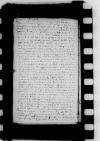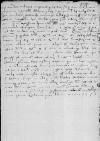Quantum me Dominatio Vestra Reverendissima ⌊⌋ suis IIII-ta huius datis exhilaravit, exprimere nequeo. Solvit enim me ex non parvo metu, nedum solicitudine, quam intra me tacitus de rebus nostris in oris ⌊Valachiae⌋ non abs re conceperam, formidans ac reputans hoc, quod vulgato adagio dici solet
cf. WALTHER, Proverbia No. 18891a ⌊“nulla calamitas sola”cf. WALTHER, Proverbia No. 18891a ⌋, ne forte post hanc turbationem et nostrorum tumultum, qui inibi ⌊serenissima maiestate regia⌋ praesente excitatus fuerat, gravius aliquid, ut in eiusmodi casibus contingere consuevit, suboriretur[1]. Nulla siquidem res sic hostium animos etiam meticulosos reficere, immo et firmare potest, quam cum eos, quos timent, inter se dissidentes comperiunt, infectaque re, qua formidine tremoreque correpti erant, discordia agitatos subito abire ac coepta relinquere. Atqui Deus Omnipotens, cui laus, honor, omnis gratiarum actio, longe felicius, quam ego futurum verebar, res ⌊serenissimae maiestatis regiae⌋ omniumque nostrorum tractavit, prosperioremque dedit exitum et successum. Qui
revera hoc tempore, ut ⌊⌋ Dominatio Vestra Reverendissima, prosecutionem postulat, interea, quo adhuc ex recenti clade trepidatio est in hostibus. Quod si nostri vel hac unica Dei benignitate, quae pro nobis pugnavit, promoveri et induci possent, ut ad cor et in se redirent animosque pristinos et se dignos reciperent, nulla umquam prius occasio et oportunitas fuit commodior, quam praesenti hieme ⌊Valachum⌋ et invadendi, et
cf. Pl. Mil. 334 deturbabo iam ego illum de pugnaculis ⌊de sede penitus deturbandicf. Pl. Mil. 334 deturbabo iam ego illum de pugnaculis ⌋. Quod haud dubie subsequeretur, modo eam nostris Deus mentem, saepe prius concessam, iterum imprimeret, qua relictis intestinis odiis ac dissidiis potius in hostes quam
cf. Liv. 1.53.11 in se ipsum postremo saeviturum ⌊in se ipsos saevirentcf. Liv. 1.53.11 in se ipsum postremo saeviturum ⌋. Quid effecerit discordia, multa praeteriti et non pauca nostri temporis acta declarant, quae quidem discordia nimirum et ⌊serenissimi
Romanorum regis⌋, dum inter se duces mutuis odiis iampridem conceptis decertant, ⌊⌋. “cf. Missale f. 83v-84r Ubi charitas et amor, Deus ibi est ⌊Ubi caritas et amor, ibi Deus est.cf. Missale f. 83v-84r Ubi charitas et amor, Deus ibi est ⌋”
cf. Aug. in Ioh. Evang. Tract. 83. col. 1846 Ubi caritas est, quid est quod possit deesse? Ubi caritas non est, quid est quod possit prodesse? ⌊Ubi Deus est, ibi adsunt bona omniacf. Aug. in Ioh. Evang. Tract. 83. col. 1846 Ubi caritas est, quid est quod possit deesse? Ubi caritas non est, quid est quod possit prodesse? ⌋. Quibus hii carent, qui in sese exulcerati per cacadaemones exagitantur. Sumus profecto in posteriore hoc saeculo, in quo
cf. Vulg. Io 12.31 nunc princeps huius mundi eicietur foras; Vulg. Io 14.30 venit enim princeps mundi huius; Vulg. Io 16.11 quia princeps mundi huius iudicatus est ⌊princeps mundi huiuscf. Vulg. Io 12.31 nunc princeps huius mundi eicietur foras; Vulg. Io 14.30 venit enim princeps mundi huius; Vulg. Io 16.11 quia princeps mundi huius iudicatus est ⌋
imperiose suos exercet, quot iam
cf. Vulg. Apc 20.7-10 solvetur Satanas de carcere suo et exibit et seducet gentes ⌊a fide, religione et pietate deiecitcf. Vulg. Apc 20.7-10 solvetur Satanas de carcere suo et exibit et seducet gentes ⌋. Alius, ⌊qui protector dicebatur⌋[2], nunc totus adversatur fidei turpi ductus in tot stupra et adulteria libidine. Cuius ⌊concubinae, quam vocant reginam⌋, in dies expectatur partus. Si masculum pepererit (sic stant pacta matrimonii), vera est coniunx; si feminam, solutum est coniugium: tamquam <tam> diu stupris uti liberum erit, quousque ex aliqua nascatur filius. Pulchrum, si diis
placet, ius matrimonii, omni exsecratione iraque ac castigatione Dei dignum, quam non ob id solum, sed ob innumeras caedes novasque crudelitates, quibus in suos in dies fit truculentior, iure optimo meruit atque iusto Dei iudicio experietur brevi.
⌊Alter⌋, qui cum suis progenitoribus Christianissimus vocabatur, nonne inChristianissimus impiissimusque factus ⌊Christi⌋que eiusque fidei hostibus perfidissimis impurissimisque ⌊Turcis⌋ aperto foedere contra Christianos est coniunctus, nulla re
nisi immodica ambitione imperandique
cf. Verg. A. 3.57 auri sacra fames; Hor. Epist. 1.18.23 argenti sitis importuna famesque; Ov. Met. 1.131 amor sceleratus habendi ⌊cupidine sitique auricf. Verg. A. 3.57 auri sacra fames; Hor. Epist. 1.18.23 argenti sitis importuna famesque; Ov. Met. 1.131 amor sceleratus habendi ⌋
et Christiani sanguinis insatiabili illectus at protractus a principe mundi huius undique clandestinis simultatibus, factionibus, inimiciciis, bellisque perniciosissimis occupati adeo, ut evangelium
hoc Mathei XXIIII “
cf. Vulg. Mt 24.15 cum ergo videritis abominationem desolationis ⌊Cum videritis abhominacionem desolationiscf. Vulg. Mt 24.15 cum ergo videritis abominationem desolationis ⌋
etc.” aptissime huic nostro saeculo conveniat.
cf. Vulg. Mt 24.20 orate autem ut non fiat fuga vestra hieme vel sabbato ⌊Orandus est Deus sancte et pie vivendo, ne fugam hanc hieme aut sabbatocf. Vulg. Mt 24.20 orate autem ut non fiat fuga vestra hieme vel sabbato ⌋ quam minatur, sed suam nobis det in diebus nostris gratiam et pacem, amen.
Gratum mihi fuit plurimum, quod profectio Dominationis Vestrae Reverendissimae ad serenissimum ⌊Romanorum regem⌋ comperendinationem acceperit, eo quod id, quod ad meam et ⌊reverendissimi domini electi⌋ successoris mei expeditionem adhuc ad ⌊curiam Romanam⌋ reliquum est, facilius opera et intercessione Dominationis Vestrae Reverendissimae a serenissima ⌊maiestate regia⌋ obtinebimus. Misi igitur superiori die[3] hinc ad Dominationem Vestram Reverendissimam ⌊fratrem meum Bernardum⌋, qui, priusquam istae perferentur, aderit, ab eoque Dominatio Vestra Reverendissima habebit omnia. Ceterum, cum iam breve apostolicum receperim, quo mihi licet postulatione nondum confirmata bona ⌊episcopatus Varmiensis⌋ administrare, simque ad hoc a ⌊venerabili capitulo⌋, ut eo me conferam, rogatus, destinavi ⌊hinc⌋ reculis meis praemissis relictisque hic officialibus meis ipso 1537-12-04⌊die sanctae Barbarae1537-12-04⌋ proficisci, cum Deoque et 1537-12-06⌊sancto Nicolao1537-12-06⌋ ⌊Heilsbergum⌋ ingredi. Futurusque perpetuo pro tot in me collatis beneficiis non ingratus debitor Dominationi Vestrae Reverendissimae, cui me summopere commendo, Deumque precor, ut eandem quam diutissime prosperrime valentem ac felicissimam conservet.
[1 ] Dantiscus is referring to the “hens’ war” (“wojna kokosza”, summer 1537) – a rebellion (rokosz) of the gentry who had been called to arms for a retaliatory expedition against the Moldavian hospodar, Petru Raresh. The expedition, which turned into a demonstration against the king near Lvov, never got as far as the border of the Kingdom of Poland (cf. e.g.
cf. KONOPCZYŃSKI 1 p. 113-115 ⌊Konopczyński, p. 113-115cf. KONOPCZYŃSKI 1 p. 113-115 ⌋; cf. BAZYLOW p. 338-339 ⌊Bazylow, p.338-339cf. BAZYLOW p. 338-339 ⌋).
[2 ] Dantiscus is referring here to the title Defensor fidei, granted to Henry VIII by the papal decree of October 11, 1521, in recognition of his writing a minor work against Luther’s views - Assertio Septem Sacramentorum (printed version of the decree:
cf. Bullarium No. 51, p. 773-775 ⌊Bullariumcf. Bullarium No. 51, p. 773-775 ⌋)
[3 ] Dantiscus’ brother Bernard von Höfen set off for Cracow not on November 20 (superiori die) but on November 16 (cf. ⌊⌋).

